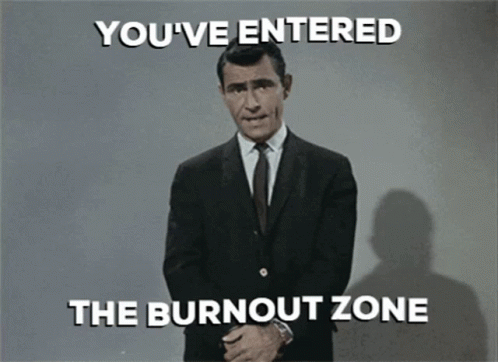God Takes Our Mental and Physical Health So Seriously He Commands Us to Rest

Americans are workaholics. We place an unhealthy emphasis on accomplishment and productivity.
We tried to combat our addiction to work throughout the mid to late twentieth century. The theory was as technology improved, life would get easier, work would become less stressful, and there’d be an increase in leisure activity and rest.
In a twist of irony, the reality has been the exact opposite. With the advancement of technology and increased globalization, people are often expected to be available and productive 24 hours a day.
As a religious person of "Misfit Faith," I believe God values work but places an even higher value on rest. Yeah, that's not a typo;
I believe God cares even more about our rest than God does our work.
It takes all of the first two chapters of the Bible to learn that God himself is a God who both creates and rests. Have you ever wondered why God rested on the 7th day? Was God tired? Can God get tired?
God rests because God is a God of rest and commands his people to rest regularly.
As a millennial, I am a part of the first generation in American history to pursue and obtain all the markers that were supposed to lead to the "American Dream." However, instead of obtaining the fruits of that dream (financial security, stability, a healthy work/life balance), we've experienced burnout. According to the Mayo Clinic, burnout is,
"a state of physical or emotional exhaustion that also involves a sense of reduced accomplishment and loss of personal identity." Job Burnout: How to spot it and take action
Burnout can lead to extreme stress, anxiety, fatigue, and depression. As a result, those of us experiencing burnout can often stray into addiction, or other destructive behaviors as a means of coping, along with long-term mental and physical illness. Burnout has become so prevalent among millennials, we have been labeled the burnout generation.

To read more about how millennials became the burnout generation, check out the article How Millennials Became The Burnout Generation by Anne Helen Peterson.
As work drives us to physical and mental illness in record numbers, it's important to understand that God takes our need to rest seriously. God takes rest so seriously that he included resting in the ten commandments.
God's Command to Rest
The ten commandments are often referred to as “the baseline of ethics.” If you want an idea of the principles God values regarding humanity's relationship with him and each other, look at the ten commandments.
In the ten commandments, we see things like,
- “you must not murder”
- "you must not steal," etc...
At a basic human level, we understand we shouldn't kill, or steal from each other. From an ethical standpoint, those commandments make sense.
What often seems out of place is how in the midst of God sharing how people should relate to him and each other he makes a hard pivot and tells us to rest. Let’s take a look at this commandment:
8 “Remember the Sabbath day and keep it holy. 9 Six days you shall labor and do all your work. 10 But the seventh day is a Sabbath to the Lord your God; you shall not do any work—you, your son or your daughter, your male or female slave, your livestock, or the alien resident in your towns. 11 For in six days the Lord made heaven and earth, the sea, and all that is in them, but rested the seventh day; therefore the Lord blessed the Sabbath day and consecrated it. (Exodus 20:8-11, NRSV)
A Few Observations...
Before jumping into principles for rest let's pause and unpack two interesting observations based on the above text.
- Resting (or the sabbath) receives the most explanation than any of the ten commandments. More than not killing, stealing, coveting, or idol worshipping, the command to rest gets the most air time.
- Notice there's no command to work? Mind you, that's not to say God wants us all to be lazy asses. It's assumed that if he's telling us to rest, there's something we need to rest from (e.g., work). It seems God doesn't command us to work because there's already a proclivity for us to do that, but what we don't do naturally is rest. We're so prone not to rest that God has gone out of his way to demonstrate that even God rests because it's right and good, and he commands us to rest, so maybe we can take a hint and get some damn rest!
Principles for Rest
Now, let's get to the principles...
1. Remember to rest. God purposely begins this commandment with the phrase “remember.” God knows how quickly we forget, he also knows how destructive we can be to ourselves and one another in the pursuit of what we want. By starting this commandment by saying "remember" God is actively calling us to slow down and rest regularly (remembering assumes an ongoing habit) for the sake of ourselves and those around us.
FUN FACT: Have you ever wondered why we get two days off every week in America? As the story goes, during our nation's founding, the architects of America were conflicted about which day should be the sabbath. Especially as America wrestled with religious freedom it was conflicted with making Sunday the Sabbath, wouldn’t that force everyone to adhere to Christian customs? Well, what about Saturday? That would force everyone to adhere to Jewish customs. Ultimately, it was decided to meet in the middle, and in the name of religious freedom, we made both Saturday and Sunday days off. Ok, back to our principles...

2. We rest because God first demonstrated rest to us: Verse 11 tells us because God rested on the seventh day, the sabbath day is blessed. God’s resting comes from Genesis 2:2-3 which says,
“2 On the seventh day, God had finished his work of creation, so he rested from all his work. 3 And God blessed the seventh day and declared it holy because it was the day when he rested from all his work of creation.” (NLT)
I proposed the question in the introduction, what does it mean that God rested? When God rested, it meant that his creative work was complete. Because of its completion, God was satisfied and even called it “very good.” God’s rest is not about rejuvenating or recharging his energy (like it is for us), rather it is about enjoying the work of his hands.
Do you remember that saying, "All work and no play makes Jack a dull boy?" The gist of this proverb is if Jack only works and never rests he'll be a boring and stunted human being. Well, so will we if we only work and never rest. That's why God shows us how his resting is similar to a home builder who stands back and savors the beauty and completeness of a newly built house. God's rest is rooted in enjoying the work of his hands, and we should rest like God and not obsessively work like Jack.
3. Rest is “blessed” because rest rejuvenates and refills us: God’s blessing something always comes with fullness and joy. When God says that the sabbath is blessed, he says that time for rest brings us fullness and joy as we do two things.
- We find our rest and joy in remembering and enjoying all the good in our lives.
- We slow down to appreciate all we have and all we've received through the work of God and others.
We live in a day where buzzwords like "maximize," "efficiency," "productivity," "results-oriented," etc...Hell I've written about most of these topics myself.
To be counter-cultural is to work hard and rest even harder regularly. Rest is a reminder of our limitations and weaknesses and is a powerful antidote to prioritizing our mental and physical health. God cares so much about our health he commands us to chill the eff out. 🧘🏻♂️




